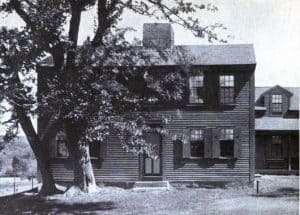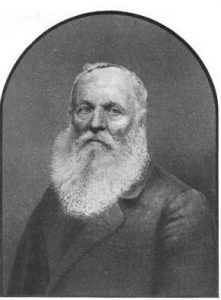
Amos Bronson Alcott and Charles Lane began searching for a new location for their utopia. Ultimately, Lane chose a property in Harvard, Massachusetts to become Fruitlands. He was specifically looking for land outside of Concord to avoid Ralph Waldo Emerson’s influence on Alcott.
Charles Lane along with the Alcotts, made the 14-mile journey from Hosmer Cottage to Fruitlands on June 1, 1843. Wood Abram and Samuel Larned, two men Alcott and Lane had convinced to join Fruitlands, had gone ahead to prepare the property for their arrival along with Lane’s son.
Living at Fruitlands proved to be a great strain on Bronson and Abigail “Abba” Alcott’s marriage. At Fruitlands, nearly all the household chores fell on Abba’s shoulders. Abba prepared the bread and apple diet for everyone, though she did not want to eat it. She was also excluded from the decision-making and was forced to abide by a strict schedule.
One man who never officially joined Fruitlands, but was necessary to its survival, was Joseph Palmer. Palmer was a farmer who lived close by and performed free manual labor at Fruitlands. He had previously spent time in prison because he stabbed a man who tried to shave Palmer’s beard. In the early 19th century, long beards were very uncommon.

Fruitlands attracted some remarkably odd people. One early recruit was Samuel Larned, he was twenty years old and had spent time at Brook Farm. Larned came to Fruitlands because he agreed people should stick to a strict diet. He is said to have lived a year eating only apples, and another on only crackers. Another early recruit was Wood Abram. His notable eccentricity was changing his name from Abram Wood to Wood Abram while at Fruitlands.
Another member of the community was Abraham Everett. Everett had spent time in a mental asylum before coming to Fruitlands. He had manual skills, but few social skills. Everett was the only man who helped Mrs. Alcott with the household chores. Samuel Bower also lived at Fruitlands. He was a nudist from England. It seems Bower was asked to keep his clothes on while at Fruitlands, but he did go into the forest at night without clothes on a few occasions.
In early July, Isaac Hecker came to Fruitlands from Brook Farm. Hecker went on to leave Fruitlands, citing a lack of fruit. He believed he had been misled. The only woman outside the Alcott family that stayed at Fruitlands was Anna Page from Rhode Island. Miss Page did not come to Fruitlands until late August.
Before he died, after becoming a Catholic priest, Isaac Hecker deemed Alcott, Thoreau, and Emerson, “three consecrated cranks.”
Thoreau, consecrated crank or not, never visited Fruitlands. But the Fruitlands community played host to many others. People like George Ripley, founder of Brook Farm, the poet Ellery Channing, and Theodore Parker, a radical minister, visited, but did not stay long term at Fruitlands.
Around the fourth of July, Emerson paid a visit to Fruitlands. He wrote that,
“The sun & evening sky do not look calmer than Alcott & his family at Fruitlands. They seemed to have arrived at the fact, to have got rid of the show, & so to be serene.”
However, Emerson predicted that Fruitlands would run into problems. He continued,
“I will not prejudge them successful: They look well in July; we will see them in December.”
As Emerson predicted, Fruitlands fell apart that winter. By October, visitors had stopped coming, and many Fruitlands residents had left. In November, Mrs. Alcott was ready to leave. Mrs. Alcott declared that she would take her daughters and live in the home of one of her friends. Bronson Alcott had to choose between his family or Charles Lane and the utopia. It was not much of a choice. Lane admitted that he and Alcott “could not remain together without [Mrs. Alcott]. To be ‘that devil come from Old England to separate husband and wife.’”
Fruitlands, like Thoreau’s time at Walden Pond, was an experiment in living and embodying values of Transcendentalism. Fruitlands, in its failure, teaches that Transcendentalism does not make a strong foundation for a community. Where Fruitlands succeeds is its vision and bravery in breaking from the norm. Alcott and Lane set out to create something that had never quite been done before, or since.

